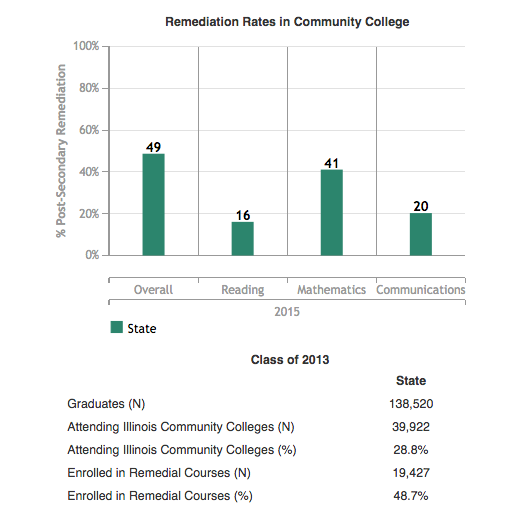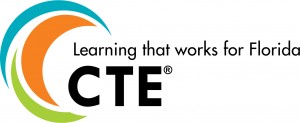With Half of Illinois Community College Students Required to Take Remedial Courses, New Law Aims to Improve College and Career Readiness in the State
 Last month Governor Bruce Rauner of Illinois signed the Postsecondary and Workforce Readiness Act into law, cementing a cross-sector effort to transform the educational system in Illinois and better prepare students for college and careers. According to Advance Illinois, an education nonprofit, half of high school students enrolling in community colleges in Illinois are required to take remedial education during their first year. The law aims to reduce the remedial education rates in the state and prepare students for future careers through four major strategies:
Last month Governor Bruce Rauner of Illinois signed the Postsecondary and Workforce Readiness Act into law, cementing a cross-sector effort to transform the educational system in Illinois and better prepare students for college and careers. According to Advance Illinois, an education nonprofit, half of high school students enrolling in community colleges in Illinois are required to take remedial education during their first year. The law aims to reduce the remedial education rates in the state and prepare students for future careers through four major strategies:
- Defining Postsecondary and Career Expectations: The law calls on a joint committee (including the State Board of Education, the Board of Higher Education, the Community College Board and the Student Assistance Commission) to define specific, grade-level expectations for career and postsecondary exploration. These expectations, which cover grades 8 through 12, are to be published by July 2017.
- Piloting a Competency-Based High School Graduation Requirements Program: A new pilot program established under the law will permit selected school districts to replace current graduation requirements with competency-based learning systems. One challenge with competency-based education is evaluating student learning in a way that is recognized by colleges or employers. As such, the law requires participating school districts to create a plan to assess student mastery and to partner with two-year and four-year higher education institutions to ensure that a competency-based system can still provide colleges the information they need to admit incoming students.
- Establishing a College and Career Pathway Endorsement Program: The endorsement program is designed to recognize student learning and incentivize entry into high-need career pathways. To be eligible for an endorsement, students must develop and maintain an individualized college and career plan, complete at least two years of coursework on a career pathway that leads to a degree or certificate with labor-market value, complete career exploration activities, and demonstrate readiness for non-remedial coursework.
- Providing Transitional Instruction in Math and Reading: Finally, the law calls on community colleges and K-12 school districts to reduce remedial education in college by creating transitional math and reading opportunities in 12th grade. These classes will help prepare students for credit-bearing college courses and, as such, will be recognized by colleges across the state. In developing competencies for instructional coursework, the law also requires the state to draw on expertise from private sector employers.
The law will be implemented over the course of several years. The competency-based education pilot program will be launched during the 2018-19 school year;  the pathways endorsement program will be launched in the 2019-20 school year; and transitional mathematics courses will also be available statewide by 2019-20.Â
North Carolina to Offer Teacher Bonuses for Industry-Recognized Credentials in New Pilot Program
When North Carolina passed its budget for fiscal year 2016-17 last month, it launched a new pilot program to encourage student learning in high-demand industries. The program — which will start immediately, using data from the 2015-16 school year — will reward Career Technical Education (CTE) teachers with up to $50 for each student who goes on to obtain an industry-recognized credential.
The size of the reward will depend on the academic rigor and employment value of the earned credential. Academic rigor will be evaluated based on the instructional hours, work experience and postsecondary credit that are associated with the credential. The second value criteria, employment value, will consider the entry wage, growth rate and job opportunities for the occupational category.
Before the pilot program sunsets in June 2018, the State Board will report back to the legislature on the amount of awards provided, the number of industry credentials earned, and the effects of the program on teacher performance and retention.
Austin Estes, Policy Associate


